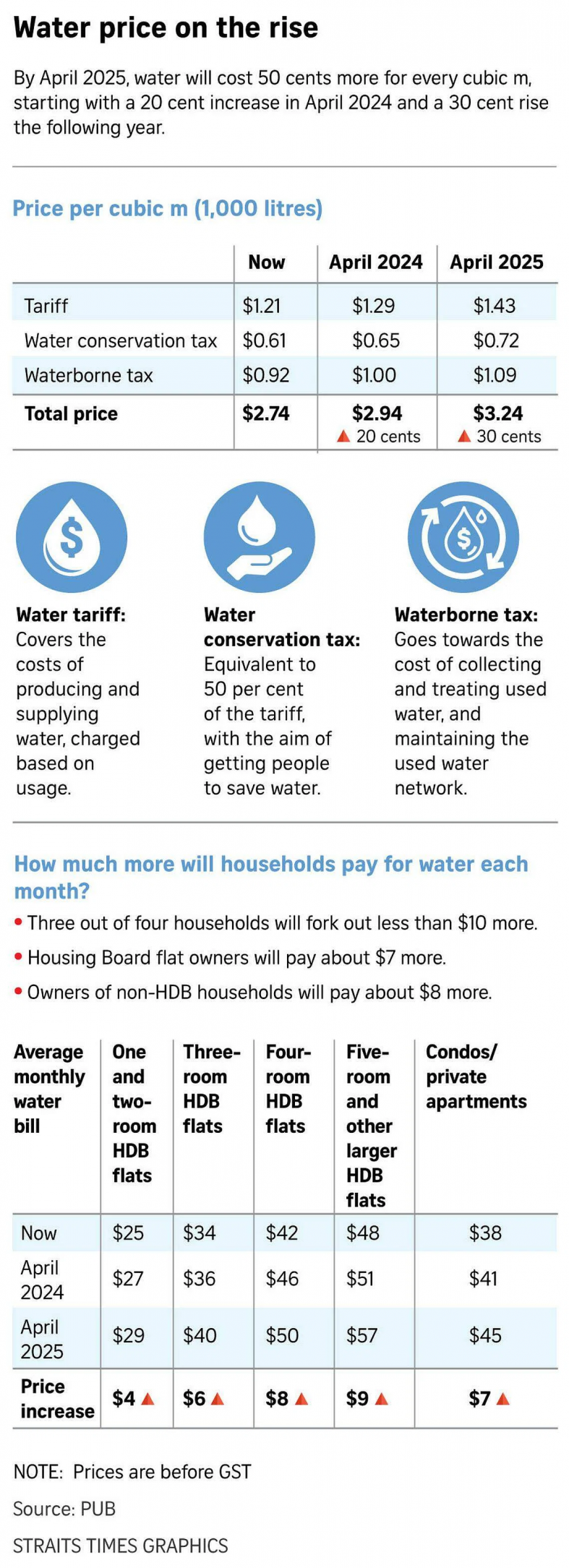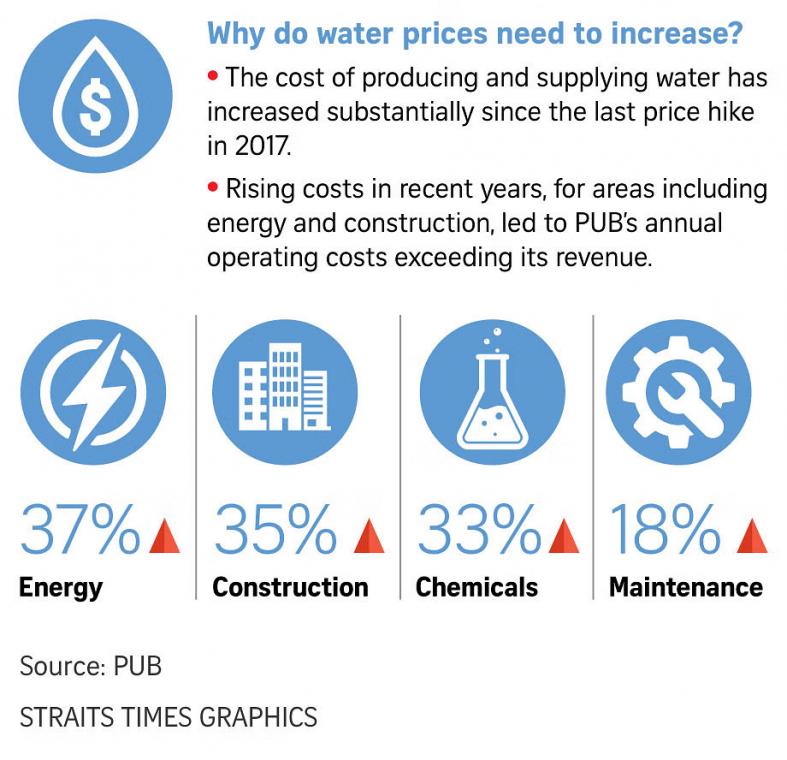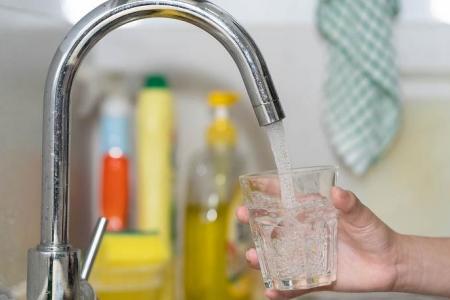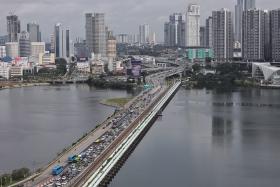S’pore water price to rise by 50 cents per cubic m by 2025; lower-, middle-income families to get help
Water will soon cost consumers an additional 50 cents per cubic m, starting with a 20-cent increase in April 2024 and a 30-cent rise in April 2025.
This means that most households will fork out an additional $4 to $9, excluding GST, for their monthly water bill by 2025, said national water agency PUB on Wednesday.
In 2020, the average monthly consumption of water was 15 cubic m for condominiums and 16.2 cubic m for HDB flats.
Lower- and middle-income households will get help to offset some of the price increase. Deputy Prime Minister and Finance Minister Lawrence Wong will announce cost-of-living support measures to provide more relief for Singaporean households on Thursday.
The last water price hike of 30 per cent happened in 2017. The upcoming 50-cent rise – bringing the cost of 1 cubic m, or 1,000 litres, of water to $3.24, is an 18 per cent increase.
The price hike between 1997 and 2000 saw water prices rising by 120 per cent for households.
The upcoming increase comes amid rising living costs, GST hikes and higher transport fares, and the water agency did not take the decision lightly, said a PUB spokesman.
“The water price increase is not popular, but necessary,” the spokesman said.
“We understand that it can draw strong reactions amid the other cost of living pressures. That’s something we are very mindful of, so PUB does not take this decision lightly.”
It has been increasingly more expensive to produce and supply water, PUB said, and there is a need to invest more in local water infrastructure – especially in weather-resilient Newater and desalinated water – to brace Singapore for drier days ahead due to climate change.
And Singapore’s water demand, which is currently at about 1.95 million cubic m – or 440 million gallons – each day, is expected to almost double by 2065.

Singapore has four sources of water: imports from Malaysia, water from local catchments, Newater and desalinated seawater.
Pressures such as higher energy prices and construction costs have contributed to PUB’s annual operating costs exceeding its revenue in the 2021 and 2022 financial years.
In 2019 and 2020, PUB saw a slight net positive in revenue owing to the 2017 water price hike.
Electricity tariffs have risen by about 37 per cent, while construction costs have gone up by 35 per cent, with higher increases for specialised works such as tunnelling and pipeline projects through highly urbanised areas.
Due to inflationary pressures and supply chain disruptions, the cost of essential chemicals to treat used water, for example, has risen by about 33 per cent. Higher manpower costs have driven maintenance expenses by 18 per cent.
These external cost drivers have worsened the operating deficit significantly in the latest fiscal year, said PUB.
Its spokesman said: “If we were to defer the price increase any further... essentially we would have an even bigger price increase moving forward.”
Rising operational costs and inflation are not affecting Singapore alone.
Between July 2022 and July 2023, the average increase in water-related bills worldwide was 8.2 per cent, the second-highest rise recorded by the Global Water Intelligence, a leading publisher for the international water scene.
By April 2025, three in four households will see an increase of less than $10 in their monthly water bills, with tenants of one- and two-room flats paying about $4 more.
Water bills account for less than 2 per cent of an average household’s expenditure.
Most households use less than 40 cubic m of water every month. But about 4 per cent of homes exceed this, and they will be charged a higher rate of 70 cents more per cubic m - or a total of $4.39 – to discourage water wastage.
As for businesses, about 75 per cent of them will fork out less than $25 more every month with the price hike.
Three in four hawkers will also pay less than $15 more each month. Businesses’ utility bills make up less than 5 per cent of their business costs.
However, businesses will be reminded not to engage in profiteering from the water price hike and relevant government agencies will monitor food prices set by hawker centres and coffee shops, added PUB.
The price hike will be phased over two years to give households and businesses more time to adjust and adopt water conservation measures.
The agency urged businesses to tap the recently enhanced Water Efficiency Fund to set up recycling and water-efficient technologies so that their water usage and bills shrink.
One- to three-room households can redeem $50 in e-vouchers under the Climate Friendly Households Programme to buy water-efficient shower fittings that can help to save water and reduce their bills.

The spokesman said PUB the additional revenue from the water price increase is expected to cover about one-third of its investments in the next few years.
PUB may expand its Newater capacity because there will be more used water to treat as demand grows, and it is more cost-effective than desalination.
By 2025, the price of every cubic m of Newater will also increase by 17 cents to $2.50.
Newater is mainly supplied to wafer fabrication plants, industrial estates and commercial buildings.
By 2065, two-thirds of water demand is expected to come from non-domestic sectors.
Several countries have less reliable and comprehensive water services, noted Dr Cecilia Tortajada, an adjunct senior research fellow at the Lee Kuan Yew School of Public Policy’s Institute for Environment and Sustainability.
She cited how in the United States, some residents receive regular advisories to boil their tap water to get rid of contaminants. When people move into newly built houses in parts of South Africa, water infrastructure and piping may be unfinished.
Dr Tortajada said: “People in Singapore are not just paying for the amount of water they use, but also for its excellent quality and reliable service that allows clean drinkable water to flow from taps at any time.”
Get The New Paper on your phone with the free TNP app. Download from the Apple App Store or Google Play Store now


